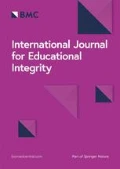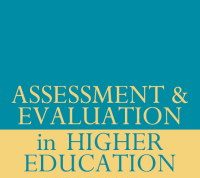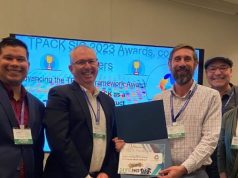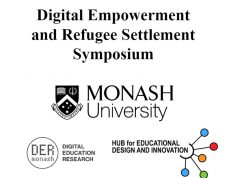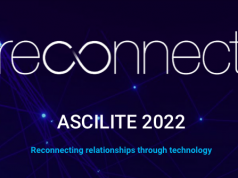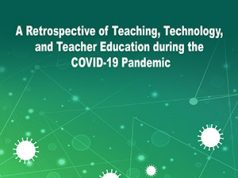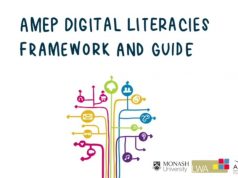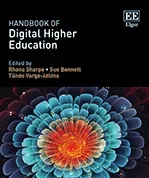 Dr Henderson is Professor of Digital Futures in the Faculty of Education, Monash University.
Dr Henderson is Professor of Digital Futures in the Faculty of Education, Monash University.
His research lies in the implications and applications of digital technologies in learning from the early years through to tertiary settings. This includes practices around assessment, feedback and creative risk taking. He is a founding member of the DER (CEMM/LNM) research group.
Email: michael.henderson@monash.edu
Twitter @mjhenderson
Other profile sites: Monash Profile | Google Scholar | Academia.edu | Research Gate
 Michael is a world expert in the field of digital education, in particular the effective use of technology in internet enabled teaching and learning. Unique to his profile is that his research spans early childhood, schools, universities and professional learning contexts.
Michael is a world expert in the field of digital education, in particular the effective use of technology in internet enabled teaching and learning. Unique to his profile is that his research spans early childhood, schools, universities and professional learning contexts.He is the recipient of ARC Discovery and Linkage grants, as well as other notable research schemes including the Spencer Foundation. Michael served as Lead Editor for the international journal Australasian Journal of Educational Technology (AJET) for seven years (2014-20). He was also the co-leader (2016-2021) of the UNESCO sponsored EDUsummIT Creativity and Digital Technologies working group.
Michael is an experienced leader in higher education provision. Having served in various strategic roles coupled with his research expertise, Michael is also an Expert Advisor (2016-present) for the Tertiary Education Quality and Standards Authority (TEQSA), with a specialist focus in digital online delivery
Keynotes and workshops
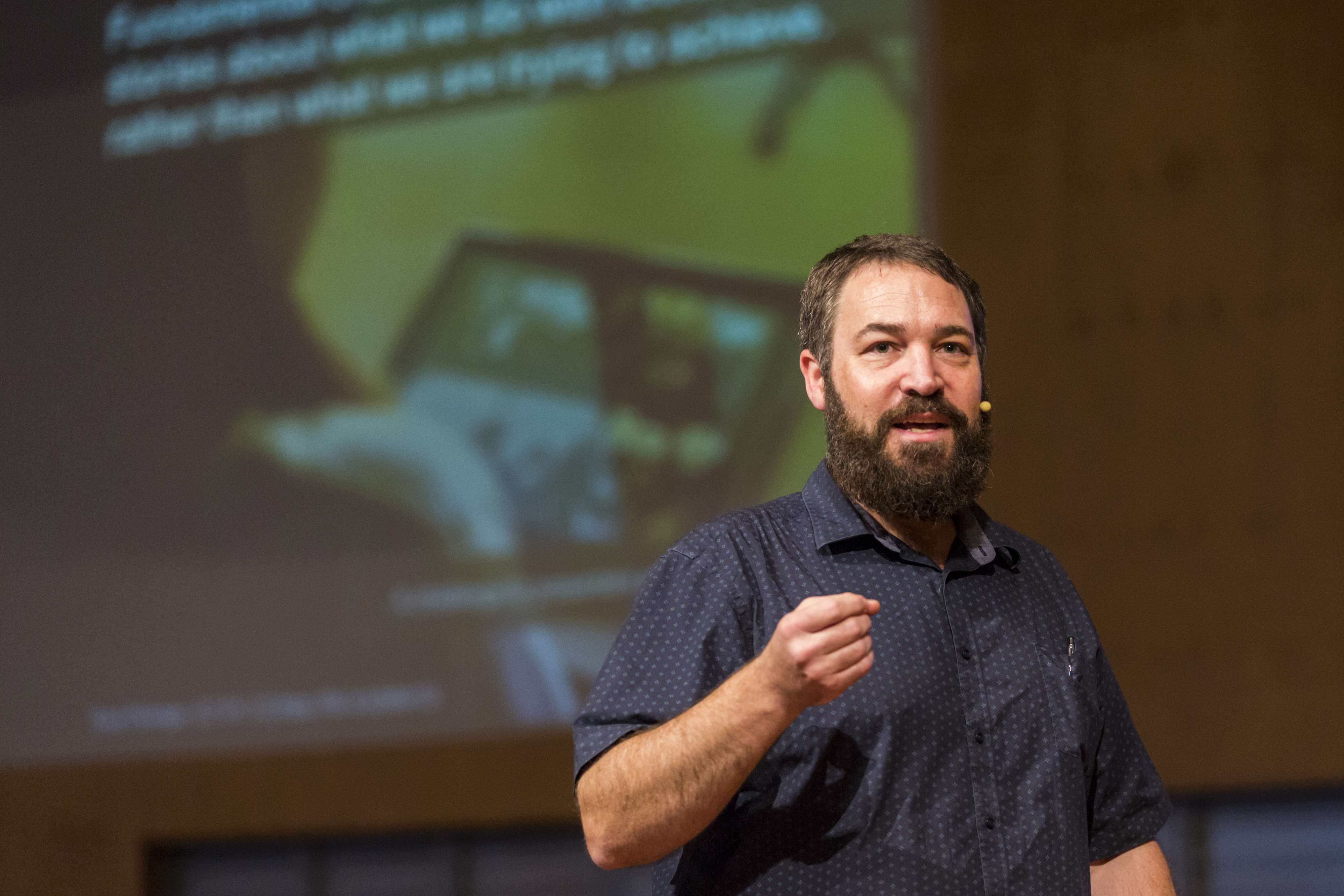
Dr Henderson has been a keynote at numerous academic and professional conferences.
A key theme in recent presentations to academic conferences and university T&L events has been focused on appropriate and effective assessment and feedback – particularly in hybrid and ‘remote’ learning contexts.
Michael also is known for his work in critical perspectives of technology, its creative use and design thinking. For example at ACCE2016 he described the coming together of education and technology as a wicked problem, from which we can design wicked opportunities.
Other conference keynotes have been for teaching association conferences (e.g., ECAWA, QSITE, HEIA), emerging fields (e.g., FabLearn), regional education department conferences (e.g., DLLC16 for Catholic Diocese of Cairns), as well as for school cluster conferences.
Michael has also provided keynotes for school PD days in which he sets the pace and direction for teacher engagement with digital technologies – demonstrating innovative e-learning strategies, learning designs, and designing thinking processes which have been shown to lead to meaningful learning.
If you would like to contact Michael regarding a keynote for an academic conference or professional learning please email.
Research Projects
Funded research projects:
- Data-smart schools: enhancing the use of digital data in secondary schools (Australian Research Council Discovery Project, $352,000)
- Feedback for Learning: Closing the assessment loop (OLT Innovation and Development Fund, $280,000)
- A best practice framework for playgroups-in-schools (Australian Research Council Linkage Project, $336,000)
- What works and why? Understanding successful technology-enabled learning within institutional contexts (OLT Strategic Commissioned Project, $220,000)
- School data for all (Spencer Foundation, $40,000)
- Open for learning (Office for Learning and Teaching, $49,000)
- Technology mediated assessment feedback (Office of the Vice-Provost of Learning and Teaching Monash University, $133,000)
- Social media for collaborative learning (DEECD, $22,000)
- Teenagers, Legal Risks and Social Networking Sites (Victoria Law Foundation, $39,000)
- Exemplar Schools: Digistories of using innovative learning technologies (DEEWR, $75,000)
Research interests:
Dr Henderson’s research focuses on the design and implications of digital technologies in education. This interest spans issues of creativity, risk, ethics, and assessment and spans ages of early years to higher education. Michael is not only interested in how we can design for effective applications of educational technology but is also interested in the question of whether we should use digital technology.
Michael proposes technologies in education are best understand as a wicked problem, resistant to any universal design. Understanding the broader socio-ecological context is just one part of the puzzle.
Current projects include:
- Assessment feedback, including how we might leverage technology for impact
- Assessment integrity and alternative designs
- ecological studies of HE conditions leading to technology enabled learning
- design thinking as a framework for professional learning and curriculum design
- wicked problems, wicked opportunities and wicked designs
- the role of identity in mediating teacher pedagogy and student learning
- teaching, learning and researching with social networks: affordances, risks and ethical practices
- creativity and risk taking
Publications:
Books
Henderson, M., Ajjawi, R., Boud, D., Molloy, E. (Eds) (2019). The Impact of Feedback in Higher Education: Improving Assessment Outcomes for Learners. Cham, Switzerland: Palgrave Macmillan. https://doi.org/10.1007/978-3-030-25112-3
Henderson, M. & Romeo, G. (eds) (2015). Teaching and Digital Technologies: Big Issues and Critical Questions. Melbourne: Cambridge University Press.
Book Chapters
Henderson, M., Molloy, E., Ajjawi, R., & Boud, D. (2019). Designing feedback for impact. In M. Henderson, R. Ajjawi, D. Boud, & E. Molloy (Eds.), The Impact of Feedback in Higher Education: Improving Assessment Outcomes for Learners (1st ed., pp. 267-285). Cham Switzerland: Palgrave Macmillan. https://doi.org/10.1007/978-3-030-25112-3_15
Henderson, M., Ajjawi, R., Boud, D., & Molloy, E. (2019). Identifying feedback that has impact. In M. Henderson, R. Ajjawi, D. Boud, & E. Molloy (Eds.), The Impact of Feedback in Higher Education: Improving Assessment Outcomes for Learners (1st ed., pp. 15-34). Cham Switzerland: Palgrave Macmillan. https://doi.org/10.1007/978-3-030-25112-3_2
Ryan, T., Gašević, D., & Henderson, M. (2019). Identifying the impact of feedback over time and at scale: opportunities for learning analytics. In M. Henderson, R. Ajjawi, D. Boud, & E. Molloy (Eds.), The Impact of Feedback in Higher Education: Improving Assessment Outcomes for Learners (1st ed., pp. 207-223). Cham Switzerland: Palgrave Macmillan. https://doi.org/10.1007/978-3-030-25112-3_12
Henderson, M., Ajjawi, R., Boud, D., & Molloy, E. (2019). Why focus on feedback impact? In M. Henderson, R. Ajjawi, D. Boud, & E. Molloy (Eds.), The Impact of Feedback in Higher Education: Improving Assessment Outcomes for Learners (1st ed., pp. 3-14). Cham Switzerland: Palgrave Macmillan. https://doi.org/10.1007/978-3-030-25112-3_1
Ajjawi, R., Boud, D., Henderson, M., & Molloy, E. (2019). Improving feedback research in naturalistic settings. In M. Henderson, R. Ajjawi, D. Boud, & E. Molloy (Eds.), The Impact of Feedback in Higher Education: Improving Assessment Outcomes for Learners (1st ed., pp. 245-265). Cham Switzerland: Palgrave Macmillan. https://doi.org/10.1007/978-3-030-25112-3_14
Dawson, P., Henderson, M., Ryan, T., Mahoney, P., Boud, D., Phillips, M., & Molloy, E.(2018). Technology and feedback design. In M. J. Spector, B. B. Lockee, & M. D. Childress (Eds.), Learning, Design, and Technology An International Compendium of Theory, Research, Practice, and Policy. Cham Switzerland: Springer. https://doi.org/10.1007/978-3-319-17727-4_124-1
Henderson, M., Phillips, M., & Ryan, T. (2018). Designing for technology-enabled dialogic feedback. In D. Boud, R. Ajjawi, P. Dawson, & J. Tai. (Eds.), Developing Evaluative Judgement in Higher Education: Assessment for Knowing and Producing Quality Work. London: Taylor & Francis.
Dawson, P., & Henderson, M. (2017) How Does Technology Enable Scaling Up Assessment for Learning? In D. Carless, S.M. Bridges, C.K.Y. Chan, & R. Glofcheski (Eds.), Scaling up Assessment for Learning in Higher Education. Singapore: Springer. https://doi.org/10.1007/978-981-10-3045-1_14
Henderson, M., Henderson, L., Grant, S., & Huang, H. (2018). Cognitive Engagement in Virtual Worlds Language Learning. In S. Gregory., D. Wood. (Eds.), Authentic Virtual World Education Facilitating Cultural Engagement and Creativity. Singapore: Springer. https://doi.org/10.1007/978-981-10-6382-4
Henderson, M. (2015). The (mis)use of community of practice: Delusion, confusion and instrumentalism in educational technology research. In Scott Bulfin, Nicola F. Johnson and Chris Bigum (Eds). Critical perspectives on education and technology. New York: Palgrave Macmillan.
Edwards, S., Skouteris, H. Nolan, A., & Henderson, M. (2015). Young children’s internet cognition. In S. Garvis & N. Lemon (Eds.), Technologies in the early years. New York: Routledge.
Henderson, M., & Romeo, G. (2015). Why focus on big issues and critical questions? In M. Henderson & G. Romeo (Eds.), Teaching and Digital Technologies: Big Issues and Critical Questions, (1-8). Melbourne: Cambridge University Press.
Henderson, M. (2015). Using social media: assumptions, challenges and risks. In M. Henderson & G. Romeo (Eds.), Teaching and Digital Technologies: Big Issues and Critical Questions, (115-126). Melbourne: Cambridge University Press.
Gregory, S., Reiners, T., Wood, L.C., Teräs, H., Teräs, M., & Henderson, M. (2015). Gamification and digital games-based learning in the classroom. In M. Henderson & G. Romeo (Eds.), Teaching and Digital Technologies: Big Issues and Critical Questions, (127-141). Melbourne: Cambridge University Press.
Auld, G. & Henderson, M. (2014). The ethical dilemmas of Social Networking Sites in classroom contexts. In Gorg Mallia (Ed), The Social Classroom: Integrating Social Network Use in Education. Hershey, PA: IGI Global. http://dx.doi.org/10.4018/978-1-4666-4904-0.ch010
Henderson, M., de Zwart, M., Lindsay, D., & Phillips, P. (2013). Legal Risks and Social Networking: Removing the Blinkers on Cyber Safety. In Ria Hanewald (Ed.), From Cyber Bullying to Cyber Safety: Issues and Approaches in Educational Contexts. New York: Nova Science.
Phillips, M., Tour, E., Henderson, M. & Snyder, I. (2012) Giving research students a ‘Second life‘. In T. Islam, O. Lee, J. Peterson & M. Piscioneri (eds), Effectively implementing Information Communication Technology in Higher Education in the Asia-Pacific Region. New York: Nova Science Publishers.
Peer Reviewed Journal Articles
Fyfield, M. E. B., Henderson, M., & Phillips, M. (2022). Improving instructional video design: A systematic review. Australasian Journal of Educational Technology, 38(3), 150. https://doi.org/10.14742/ajet.7296
Ryan, T., Henderson, M., Ryan, K., & Kennedy, G. (2022). Feedback in higher education: aligning academic intent and student sensemaking. Teaching in Higher Education. https://doi.org/10.1080/13562517.2022.2029394
Edwards, S., McLean, K., Bartlett, J., Nolan, A., Evangelou, M., Henderson, M., Skouteris, H., & Tarasuik, J. (2022). School playgroups: Which features of provision matter? British Educational Research Journal. https://doi.org/10.1002/berj.3785
Cohen, A., Soffer, T., & Henderson, M. (2022). Students’ use of technology and their perceptions of its usefulness in higher education: International comparison. Journal of Computer Assisted Learning. https://doi.org/10.1111/jcal.12678
Henriksen, D., Creely, E., Henderson, M., & Mishra, P. (2021). Creativity and technology in teaching and learning: a literature review of the uneasy space of implementation. Educational Technology Research and Development, 69, 2091-2108. https://doi.org/10.1007/s11423-020-09912-z
Henriksen, D., Mishra, P., Creely, E., & Henderson, M. (2021). The role of creative risk taking and productive failure in education and technology futures. TechTrends, 65, 602-605. https://doi.org/10.1007/s11528-021-00622-8
Ryan, T., Henderson, M., Ryan, K., & Kennedy, G. (2021). Designing learner-centred text-based feedback: a rapid review and qualitative synthesis. Assessment & Evaluation in Higher Education, 46(6), 894-912. https://doi.org/10.1080/02602938.2020.1828819
Ryan, T., Henderson, M., Ryan, K., & Kennedy, G. (Accepted/In press). Identifying the components of effective learner-centred feedback information. Teaching in Higher Education. https://doi.org/10.1080/13562517.2021.1913723
Nolan, A., Edwards, S., Salamon, A., Straker, L., Grieshaber, S., Skouteris, H., Henderson, M., Highfield, K., & Bartlett, J. (Accepted/In press). Young children’s agency with digital technologies. Children & Society. https://doi.org/10.1111/chso.12512
Nieminen, J. H., Tai, J., Boud, D., & Henderson, M. (Accepted/In press). Student agency in feedback: beyond the individual. Assessment & Evaluation in Higher Education. https://doi.org/10.1080/02602938.2021.1887080
Henderson, M., Ryan, T., Boud, D., Dawson, P., Phillips, M., Molloy, E., & Mahoney, P. (2021). The usefulness of feedback. Active Learning in Higher Education, 22(3), 229-243. https://doi.org/10.1177/1469787419872393
Fyfield, M., Henderson, M., & Phillips, M. (2021). Navigating four billion videos: teacher search strategies and the YouTube algorithm. Learning, Media and Technology, 46(1), 47-59. https://doi.org/10.1080/17439884.2020.1781890
Creely, E., Henriksen, D., Crawford, R., & Henderson, M. (2021). Exploring creative risk-taking and productive failure in classroom practice. A case study of the perceived self-efficacy and agency of teachers at one school. Thinking Skills and Creativity, 42, [100951]. https://doi.org/10.1016/j.tsc.2021.100951
Creely, E., Henderson, M., Henriksen, D., & Crawford, R. (Accepted/In press). Leading change for creativity in schools: mobilizing creative risk-taking and productive failure. International Journal of Leadership in Education. https://doi.org/10.1080/13603124.2021.1969040
16. Creely, E., Henriksen, D., & Henderson, M. (2021). Three modes of creativity. Journal of Creative Behavior, 55(2), 306-318. https://doi.org/10.1002/jocb.452
Edwards, S., Nolan, A., Henderson, M., Grieshaber, S., Highfield, K., Salamon, A., Skouteris, H., Straker, L. (2020). Rationale, Design and Methods Protocol for Participatory Design of an Online Tool to Support Industry Service Provision Regarding Digital Technology Use “with, by and for” Young Children. International Journal of Environmental Research and Public Health, 17(23), 8819. http://dx.doi.org/10.3390/ijerph17238819
Henriksen, D., Creely, E., & Henderson, M. (2020). Folk Pedagogies for Teacher Transitions: Approaches to Synchronous Online Learning in the Wake of COVID-19. Journal of Technology and Teacher Education, 28(2), 201-208. https://www.learntechlib.org/primary/p/216179/
Ryan, T., Henderson, M., & Phillips, M. (2020). Digitally recorded assessment feedback in a secondary school context: student engagement, perception and impact. Technology, Pedagogy and Education. https://doi.org/10.1080/1475939X.2020.1744479
Molloy, E., Boud, D., & Henderson, M. (2020) Developing a learning-centred framework for feedback literacy. Assessment & Evaluation in Higher Education. https://doi.org/10.1080/02602938.2019.1667955
Henderson, M., Phillips, M., Ryan, T., Boud, D., Dawson, P., Molloy, E. & Mahoney, P. (2019). Conditions that enable effective feedback. Higher Education Research & Development, 38(7), 1401-1416. https://doi.org/10.1080/07294360.2019.1657807
Henderson, M., Ryan, T., Phillips, M. (2019). The Challenges of feedback in higher education. Assessment and Evaluation in Higher Education. 44(8), 1237-1252. https://doi.org/10.1080/02602938.2019.1599815
Ryan, T., Henderson, M., & Phillips, M. (2019). Feedback modes matter: Comparing student perceptions of digital and non‐digital feedback modes in higher education. British Journal of Educational Technology. https://doi.org/10.1111/bjet.12749
Henriksen, D., Henderson, M., Creely, E. (2019). Failing in creativity: The problem of policy and practice in Australia and the United States. Kappa Delta Pi Record, 55(1), 4-10. https://doi.org/10.1080/00228958.2019.1549429
Dawson, P., Henderson, M., Mahoney, P., Phillips, M., Ryan, T., Boud, D., & Molloy, E. (2019). What makes for effective feedback: staff and student perspectives. Assessment and Evaluation in Higher Education, 44(1), 25-36. https://doi.org/10.1080/02602938.2018.1467877
Henriksen, D., Henderson, M., Creely, E., Ceretkova, S., Černochová, M., Sendova, E., Sointu, E.T., Tienken, C.H. (2018) Creativity and Technology in Education: An International Perspective. Technology Knowledge and Learning, 23(3), 409-424. https://doi.org/10.1007/s10758-018-9380-1
Selwyn, N., Henderson, M. & Chao, S. (2018). ‘You need a system’: exploring the role of data in the administration of university students and courses. Journal of Further and Higher Education, 42(1), 46-56. http://dx.doi.org/10.1080/0309877X.2016.1206852
Edwards, S., Nolan, A., Henderson, M., Mantilla, A., Plowman, L., & Skouteris, H. (2018). Young children’s everyday concepts about the internet: implications for cyber-safety education in the early years. British Journal of Educational Technology. 49(1), 45–55. https://doi.org/10.1111/bjet.12529
Ryan, T., & Henderson, M. (2018). Feeling feedback: students’ emotional responses to educator feedback. Assessment & Evaluation in Higher Education, 43(6), 880-892. doi:10.1080/02602938.2017.1416456
Selwyn, N., Henderson, M. & Chao, S. (2017). The possibilities and limitations of applying ‘Open Data’ in schools. Cambridge Journal of Education, 47(2), 167-187. http://dx.doi.org/10.1080/
Edwards, S., Henderson, M., Gronn, D., Scott, A., & Mirkhil, M. (2017). Digital disconnect or digital difference? A socio-ecological perspective on young children’s technology use in the home and the early childhood centre. Technology, Pedagogy and Education, 26(1), 1-17. http://dx.doi.org/10.1080/1475939X.2016.1152291
Edwards, S., Nolan, A., Henderson, M., Skouteris, H., Mantilla, A., Lambert, P., & Bird, J. (2016). Developing a measure to understand young children’s Internet cognition and cyber-safety awareness: a pilot test. Early Years, 36(3), 322-335. http://dx.doi.org/10.1080/09575146.2016.1193723
Henderson, M., Finger, G., & Selwyn, N. (2016). What’s used and what’s useful? Exploring digital technology use(s) amongst taught postgraduate students. Active Learning in Higher Education, 17(3), 235-247. http://dx.doi.org/10.1177/1469787416654798
Selwyn, N., Henderson, M., & Chao, S. (2015). Exploring the role of digital data in contemporary schools and schooling – ‘200,000 lines in an Excel spreadsheet’. British Educational Research Journal. 41(5), 767-781. doi: 10.1002/berj.3186
Henderson, M., Selwyn, N., Finger, G., & Aston, R. (2015). Students’ everyday engagement with digital technology in university: exploring patterns of use and ‘usefulness’. Journal of Higher Education Policy and Management, 37(3), 308-319. doi. 10.1080/1360080X.2015.1034424
Henderson, M., Selwyn, N. & Aston, R. (2015). What works and why? Student perceptions of ‘useful’ digital technology in university teaching and learning. Studies in Higher Education. http://dx.doi.org/10.1080/03075079.2015.1007946
Henderson, M. & Phillips, M. (2015). Video-based feedback on student assessment: scarily personal. Australasian Journal of Educational Technology, 31(1), 51-66.
Bulfin, S., Henderson, M., Johnson, N. & Selwyn, N. (2014). Methodological capacity within the field of ‘educational technology’: an initial investigation. British Journal of Educational Technology, 45(3), 403-414. doi: 10.1111/bjet.12145
Gronn, D., Scott, A., Edwards, S. & Henderson, M. (2014). ‘Technological me’: Young children’s use of technology across their home and school contexts. Technology, Pedagogy and Education, 23(4), 439–454. http://dx.doi.org/10.1080/1475939X.2013.813406
Henderson, M., Johnson, N. F., & Auld, G. (2013). Silences of ethical practice: Dilemmas for researchers using social media. Educational Research and Evaluation, 19(6), 546-560. DOI: 10.1080/13803611.2013.805656.
Henderson, M., Snyder, I., & Beale, D. (2013). Social media for collaborative learning: A review of school literature. Australian Educational Computing, 28(2), 1-15. Available at: http://journal.acce.edu.
Bulfin, S., Henderson, M., & Johnson, N. F. (2013). Examining the use of theory within educational technology and media research. Learning, Media and Technology, 38(3), 337-344, doi: 10.1080/17439884.2013.790315
Henderson, M., Cerovac, M., Bellis, N., & Lancaster, G. (2013). Collaborative inquiry: building pre-service teachers’ capacity for ICT pedagogical integration. Australian Educational Computing, 27(3),69-75.
Henderson, M., Huang, H., Grant, S. & Henderson, L. (2012). The impact of Chinese language lessons in a virtual world on university students’ self-efficacy beliefs. Australasian Journal of Educational Technology, 28(Special issue, 3), 400-419. http://www.ascilite.org.au/ajet/ajet28/henderson.html
Auld, G., Snyder, I., & Henderson, M. (2012). Using mobile phones as placed resources for literacy learning in a remote Indigenous community in Australia. Language and Education, 26(4), 279-296. doi: 10.1080/09500782.2012.691512
Snyder, I., Jevons, C., Henderson, M., Gabbott, M. & Beale, D. (2011) More than chatting online: Children, marketing and the use of digital media. English in Australia 46, 3, 32-40.
Lindsay, D., de Zwart, M., Henderson, M., Phillips, M. (2011). Understanding legal risks facing children and young people using social network sites. Telecommunications Journal of Australia, 61(1), pp. 9.1 to 9.18.
de Zwart, M., Lindsay, D., Henderson, M., Phillips, M. (2011). Randoms vs weirdos: teen use of social networking sites and perceptions of legal risk. Alternative Law Journal, 36(3), pp. 153-157.
Henderson, L., Henderson, M., Grant, S., Huang, H. (2010). What are users thinking in a virtual world lesson? Using stimulated recall interviews to report student cognition, and its triggers. Journal of Virtual Worlds Research, 3(1), pp. 1-20.
Henderson, M., De Zwart, M., Lindsay, D. F., Phillips, M. (2010). Legal risks for students using social networking sites. Australian Educational Computing, 25(1), pp. 3-7.
Henderson, M., Romeo, G., Auld, G., Holkner, B. J., Russell, G., Seah, W. T., Fernando, A. E. (2010). Students creating digital video in the primary classroom: student autonomy, learning outcomes, and professional learning communities. Australian Educational Computing, 24(2), pp. 12-20.
Henderson, M., Shurville, S., Fernstrom, K. (2009). The quantitative crunch. The impact of bibliometric research quality assessment exercises on academic development at small conferences. Campus-Wide Information Systems, 26(3), pp. 149-167.
Henderson, M. & Bradey, S. (2008). Shaping online teaching practices: the influence of professional and academic identities. Campus-Wide Information Systems, 25(2). Pp.85-92.
Henderson, M. (2007). Sustaining online teacher professional development through community design. Campus-Wide Information Systems, 24(3). Pp.162-173.
Henderson, M. (2006). Fostering community cohesion to sustain small scale online professional development courses. Australian Educational Computing, 21(2). pp.9-15.
Baskin, C., & Henderson, M. (2005) Ariadnes Thread: using social presence indices to distinguish learning events in face-to-face and ICT-rich settings. ELearning, 2(3). pp.252-261.
Anderson, N., & Henderson, M. (2004) e-PD: blended models of sustaining teacher professional development in digital literacies. ELearning, 1(3). pp.383-394.
Peer Reviewed Conference papers
Cohen, A., Soffer, T, & Henderson, M. (2019). Understanding successful and sustained technology enabled learning across institutional and cultural contexts in higher education. EDMedia + Innovate Learning 2019, Amsterdam. https://academicexperts.org/conf/edmedia/2019/papers/54781/
Creely, E., Henderson, M., & Henriksen, D. (2019). Failing to succeed: the value of failure in creativity. In K. Graziano (Ed.), SITE 2019: Proceedings of Society for Information Technology & Teacher Education International Conference (pp. 1403-1411). Waynesville NC USA: Association for the Advancement of Computing in Education (AACE).
Henderson, M., Ryan, T., Phillips, M., Boud, D., Dawson, P., Molloy, E., & Mahoney, P. (2018). Conditions that support effective assessment feedback in higher education. Higher Education Research and Development Society of Australasia (HERDSA) Conference, Adelaide, Australia.
Creely, E.A., Henriksen, D. & Henderson, M. (2018). Understanding creativity and the role of technology in education: a tri-modal approach. In E. Langran & J. Borup (Eds.), Proceedings of Society for Information Technology & Teacher Education International Conference (pp. 2495-2503). Washington, D.C., United States: Association for the Advancement of Computing in Education (AACE). Retrieved October 15, 2018 from https://www.learntechlib.org/primary/p/184663/.
Phillips, M., Ryan, T., & Henderson, M. (2017). A cross-disciplinary evaluation of digitally recorded feedback in higher education. ASCILITE 2017: 34th International Conference on Innovation, Practice and Research in the Use of Educational Technologies in Tertiary Education. Toowoomba, Australia.
Ryan, T., Henderson, M., & Phillips, M. (2017). Using rich media to facilitate dialogical feedback processes. The International Conference on Information Communication Technologies in Education (ICICTE 2017) Proceedings. p. 329-337. Rhodes, Greece.
Ryan, T., Henderson, M., & Phillips, M. (2016). “Written feedback doesn’t make sense”: Enhancing assessment feedback using technologies. Australian Association for Research in Education 2016 Conference Refereed Proceedings. Melbourne, Australia.
Phillips, M., Henderson, M., & Ryan, T. (2016). Multimodal feedback is not always clearer, more useful or satisfying. ASCILITE 2016: 33rd International Conference on Innovation, Practice and Research in the Use of Educational Technologies in Tertiary Education. Adelaide, Australia.
Casminaty, T., & Henderson, M. (2016). Risky business: ICT and creativity. In S. Prestridge & P. Albion (Eds.), Australian Council for Computers in Education 2016 Conference Refereed Proceedings. Brisbane, Australia, (pp. 16-22).
Nagy, K., & Henderson, M. (2016). School data: not fit for (re)purpose. In S. Prestridge & P. Albion (Eds.), Australian Council for Computers in Education 2016 Conference Refereed Proceedings. Brisbane, Australia, (pp. 122-131).
Henderson, M., Finger, G., Larkin, K., Smart, V., Aston, R., & Chao, S-H. (2015) Conditions for successful technology enabled learning. In T. Reiners, B.R. von Konsky, D. Gibson, V. Chang, L. Irving, & K. Clarke (Eds.), Globally connected, digitally enabled. Proceedings ascilite 2015. Perth, Australia (pp. FP:122- FP:130).
Parkin, L. & Henderson, M. (2014). Mid-semester student satisfaction feedback: reducing confusion and anxiety. In B. Hegarty, J. McDonald, & S.-K. Loke (Eds.), Rhetoric and Reality: Critical perspectives on educational technology. Proceedings ascilite Dunedin 2014 (pp. 456-460). 2014_ascilite-ParkinHenderson.pdf.
Henderson, M. & Phillips, M. (2014). Technology Enhanced Feedback on Assessment. In ACEC2014 Now it’s personal: Proceedings of the Annual meeting of the Australian Council for Computers in Education, 30 September 2014 to 03 October 2014. Paper presented at ACEC2014. Adelaide, Australia, pp. 228-238.
Henderson, M., Auld, G., & Johnson, N.F. (2014) Ethics of teaching with social media. In ACEC2014 Now it’s personal: Proceedings of the Annual meeting of the Australian Council for Computers in Education, 30 September 2014 to 03 October 2014, Australian Council for Computers in Education (ACCE), Australia, pp. 221-227.
Chao, S., & Henderson, M. (2012). Gendered differences in the participation of computer science studies in Australian tertiary education. Paper presented at the ACEC2012: ITs Time Conference, Perth, Australia. http://acec2012.acce.edu.au/gendered-differences-participation-computer-…
Sailin, S., & Henderson, M. (2012). Teachers negotiation of a joint enterprise of integrating technology in a school CoP. Paper presented at the ACEC2012: ITs Time Conference, Perth, Australia. http://acec2012.acce.edu.au/teachers-negotiation-joint-enterprise-integr…
White, P., & Henderson, M. (2012). ELearning Coaches as Brokers of Practice Within and Across Schools. Paper presented at the ACEC2012: ITs Time Conference, Perth, Australia. http://acec2012.acce.edu.au/elearning-coaches-brokers-practice-within-an…
Henderson, L., Grant, S. J., Henderson, M., Huang, H. (2010).University students’ cognitive engagement while learning in a Virtual World. Proceedings of the Australian Computers in Education Conference 2010. Melbourne: Australian Council for Computers in Education.
Henderson, M., De Zwart, M., Lindsay, D. F., Phillips, M. (2010). Students use of social networking tools: legal risks and other implications. Proceedings of the Australian Computers in Education Conference 2010. Melbourne: Australian Council for Computers in Education.
De Zwart, M., Henderson, M., Phillips, M., Lindsay, D. F. (2010). ‘I like, stalk them on Facebook’: Teachers’ ‘privacy’ and the risks of social networking sites. 2010 IEEE International Symposium on Technology and Society (ISTAS ’10), 7-9 June 2010, IEEE Society on Social Implications of Technology, Australia, pp. 319-326.
Fernstrom, K., Henderson, M., Shurville, S., Whitefield, D., Whitefield, T. (eds). (2010). Special Issue: Professional and community applications of ICT in education (ICICTE 2009). Campus-Wide Information Systems, 27(3).
Henderson, M., Huang, H., Grant, S. J., Henderson, L. (2009). Language acquisition in Second Life: Improving self-efficacy beliefs. Proceedings of ASCILITE Auckland 2009, 6 – 9 December 2009, Auckland, New Zealand, pp. 464-474.
Henderson, M. (2008). Engaging eLearning strategies: role plays, debates and soap-operas. Proceedings of the Australian Computers in Education Conference 2008. Canberra: Australian Council for Computers in Education.
Henderson, M. (2008). Relationships are more important than content: designing effective Professional Development within a Community of Practice approach. Proceedings of the Society for Information Technology Education Conference 2008. Las Vegas: AACE.
Henderson, M. & Bradey, S. (2008). Recognising the importance of identity in the development of academics’ pedagogical beliefs and web-enhanced teaching practices. Proceedings of the Society for Information Technology Education Conference 2008. Las Vegas: AACE.
Auld, G., Holkner, B., Fernando, A., Henderson, M., Romeo, G., Russell, G., Seah, W.T., Edwards, S. (2008). Exemplar Schools using innovative learning technologies. Proceedings of the Australian Computers in Education Conference 2008. Canberra: Australian Council for Computers in Education.
Henderson, M. (2006). Sustaining the professional development of teachers through a model of community of practice. Australian Association for Research in Education Conference 2006. November 2006, Adelaide.
Henderson, M. (2006). Using community cohesion to sustain online professional development. Proceedings of the Australian Computers in Education Conference 2006. Cairns: Australian Council for Computers in Education.
Henderson, M. (2006). Using online community design to sustain teacher professional development. In K. Fernstrom & K. Tsolakidis (Eds.), Proceedings of the International Conference on Information Communications Technologies in Education 2006, 270-274. Abbotsford, Canada: UCFV Press.
Henderson, M. (2004). Sustaining the Professional Development of Teachers through a Virtual Learning Environment: Promoting Effective Teaching with ICT. In P. Kommers & G. Richards (Eds.), Proceedings of World Conference on Educational Multimedia, Hypermedia and Telecommunications 2004, 3061-3066. Chesapeake, VA: AACE.
Recent conference keynotes
Henderson, M. (September, 2018). Feedback for Learning: smart assessments for smart feedback. Keynote presented to the HERGA Conference 2018. Higher Education Research Group Adelaide (HERGA), Adelaide, Australia.
Henderson, M. (September, 2017). Wicked technologies and design thinking. Keynote presented to the Visual Design Teachers Association Conference, Victoria, Australia.
Henderson, M. (August, 2017). Social Media and risk. Keynote presented to the Board of Mercy Schools conference.
Henderson, M. (September, 2016). Wicked problems and playful designs. Keynote presented to the Australian Council for Computers in Education 2016 Conference, Brisbane, Australia.
Henderson, M. (August, 2016). Design Thinking in Education. Keynote presented to the 2016 Design-Led Learning Communities Conference. Cairns, Australia. Catholic Education, Diocese of Cairns.
Henderson, M. (May, 2016). The wicked problem of digital fabrication: the need for playfulness. Keynote presented to the FabLearn Australia 2015 conference, Melbourne, Australia.
Henderson, M. (September, 2015). Digital technologies: Wicked problems and playful designs. Keynote presented to the Queensland Society for Information Technology in Education (QSITE) annual conference.
Henderson, M. (April, 2015). Digital Technologies: wicked problems and playful designs. Keynote presented to the Educational Computing Association of Western Australia (ECAWA) annual conference.
Henderson, M. (October, 2014). The wicked problem of educational technology. Keynote presented to the Australian Council for Educational Computing 2015 Conference (ACEC2015)
Conference presentations
Henderson, M., & Selwyn, N. (2016, April). ‘Open’ Data? The Possibilities and Limitations of Democratizing School Data Access and Use. Paper presented at the American Educational Research Association Annual Meeting 2016, Washington, DC.
Henderson, M., & Phillips, M. (2016, April). Using digital technologies to enhance assessment feedback. Paper presented at the American Educational Research Association Annual Meeting 2016, Washington, DC.
Henderson, M., Sewyn, N., Romeo, G., & Finger, G. (2014). Mapping the realities of technology-enabled learning in universities. Paper presented at British Educational Research Association: 2014 Annual Conference, 21-23 September, London.
Selwyn, N., Henderson, M. (2014). Exploring the role of digital data in contemporary schools and schooling. Paper presented at British Educational Research Association: 2014 Annual Conference, 21-23 September, London.
Henderson, M. (2007). Shared Repertoire of Communities of Teaching Practice and their role in sustaining online professional development courses. Paper presented at Australian Association for Research in Education Conference 2007. November 2007, Fremantle.
Baskin, C., & Henderson, M. (2004) Semiotic Spaces & Teaching Places The Role of ICTs in Regenerating Teaching Practice. Paper presented at the Australian Teacher Education Association Conference. Bathurst July, 2004.
Professional journals and media
Henderson, M. (2007). Managing Chat. Education Technology Solutions, 21. pp. 28-30.
Henderson, M. (2007). Strategies for email and discussion forums. The education Technology Guide, 20. pp. 26-28.
Henderson, M. (2007). Online Communication and Collaboration: a new kind of teaching? The Education Technology Guide, 18. pp. 52-54.
Henderson, M. (2006). Online Communication and Collaboration: a new kind of teaching? QUICK: Journal of the Queensland Society for Information Technology in Education, 101(Summer). pp. 10-17.
Henderson, M. & Henderson, L. (2006). Content Design for Online Learning. QUICK: Journal of the Queensland Society for Information Technology in Education, 99(Winter). pp.3-8.
Henderson, M. (2006). Planning for Integrating Online Learning. QUICK: Journal of the Queensland Society for Information Technology in Education, 98(Autumn). pp.11-19.
Reports
Henderson, M., Boud, D., Molloy, E., Dawson P., Phillips, M., Ryan, T., & Mahoney, P. (2018). Feedback for Learning: Closing the Assessment Loop – Final Report. Canberra: Australian Government Department of Education and Training. Retrieved from: http://newmediaresearch.educ.monash.edu.au/feedback/wp-content/uploads/ID16-5366_Henderson_Report_2018.pdf
Selwyn, N., Henderson, M., Finger, G., Larkin, K., Smart, V., & Chao, S-H. (2016). What works and why? Understanding successful technology-enabled learning within institutional contexts. Sydney: Australian Government Office for Learning and Teaching.
Henderson, M., & de Zwart, M. (2014). Australian Council for Computers in Education response to the public consultation for “Enhancing Online Safety for Children.” Public consultation on Enhancing Online Safety for Children, Australian Government. Retrieved from http://www.communications.gov.au/__data/assets/pdf_file/0018/220176/Australian_Council_for_Computers_in_Education.pdf. This submission is also reproduced in the ACCE’s academic journal: Henderson, M., & de Zwart, M. (2014). Australian Council for Computers in Education submission to public consultation for “Enhancing Online Safety for Children.” Australian Educational Computing, 29(1), 1-10. Retrieved from http://journal.acce.edu.au/index.php/AEC/article/view/44.
Snyder, I. & Henderson, M. (2012) Social media for social learning: A horizon scan. Commissioned Report for the Department of Education & Early Childhood Development (DEECD). Melbourne: Monash University. 1-69.
de Zwart, M., Lindsay, D., Henderson, M. & Phillips, M. (2011). Teenagers, Legal Risks and Social Networking Sites. Commissioned Report for the Victoria Law Foundation. Melbourne: Monash University, 1-109.
Holkner, B., Romeo, G., Henderson, M., Auld, G., Russell, G., Seah, W.T., and Fernando, A. (2008). Exemplar schools: Using innovative learning technologies (DEEWR Report). Canberra: Department of Education, Employment and Workplace Relations. Retrieved from http://www.deewr.gov.au/Schooling/DigitalEducationRevolution/Pages/ExemplarSchoolsUsingInnovative LearningTechnologies.aspx
Henderson , M., Fernando, A., Holkner, B., Auld, G., Russell, G., Seah, W., Romeo, G. (2008). Exemplar Schools: Digistories of using innovative learning technologies. (DEEWR Report: Multimedia) Melbourne: Monash University. Retrieved from: http://newmediaresearch.educ.monash.edu.au/exemplar.
Other
Edwards, S., Henderson, M., & Mirkhil, M. (2010). Young children and screen time. Everyday Learning Series. Canberra, Australia: Early Childhood Australia.
Teaching:
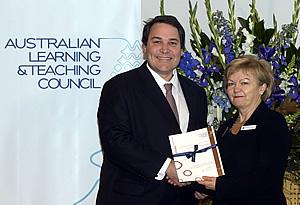
A/Prof Henderson is the Program Director for Graduate Studies in the Faculty of Education. He is also a pathway advisor for the Digital Learning specialisms MEd(Digital Learning) and MLeadership(Digital Learning). Dr Henderson lectures in a number of units related to issues of ICTE, Educational Technology and Digital Learning across undergraduate and postgraduate degrees.
Having spent 10 years in school classrooms and with his research and practice in eLearning, Dr Henderson strives to teach by example. His units are characterised as designed flexible learning spaces where students are encouraged to invest themselves in a mutual enterprise in collaborative tasks. Due to his innovative and theory driven teaching design, Dr Henderson has received competitive university and national teaching awards.
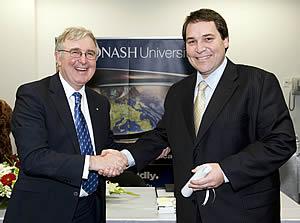
Supervision:
Postgraduate supervision is offered to students across a broad range of areas. If you are interested in becoming a postgraduate student please contact Dr Henderson with a project proposal and copies of your thesis and publications.
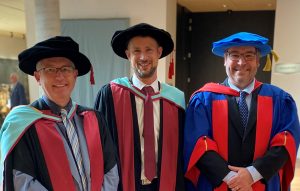 Recent PhD Completions
Recent PhD Completions
- Dr Ben Zunica – Understanding the factors that shape the pedagogical use of digital technology by mathematics teachers
- Dr Nicholas Jackson – Teachers’ knowledge and practice: The role of secondary school students in technology integration
- Dr Matthew Fyfield – Selection and use of instructional videos by secondary teachers: knowledge and context
- Dr Mahmoud A Al Saidi – Exploring Omani Undergraduate English Language Students’ Experiences With Digital Technology
- Dr Helen Dacy – Mental models in action: academic librarians in the classroom
- Dr Agus Mutohar – Exploring The Role Of Digital Technology In The Bridge School Collaboration Program In Indonesia And Australia: International Formation And Local Enactments
- Dr Edwin Creely – A phenomenological study of six doctoral students negotiating early candidature
- Dr Siti Sailin – Understanding how teachers learn to integrate technology
- Dr Stephen Guinea – Employing communities of practice to facilitate international culturally and linguistically diverse nursing students’ identities as learners in Australia through immersive simulation
- Dr Pennie White – Networks facilitating change: a case study of an eLearning community
- Dr Michael Phillips – Teachers’ TPACK enactment in a Community of Practice
- Dr Ibrahim Latheef – Investigating interactivity around Interactive Whiteboards: Cultural Historical perspectives
- Dr Nurzali Ismail – Young People’s Use of New Media through Communities of Practice
- Dr Shu-Hua Chao – Exploring the gender inequity in tertiary Computer Science courses: influential factors in females’ choices in Australia and Taiwan
- Dr Thom Cochrane – Mobilising learning: transforming pedagogy with mobile web 2.0
- Dr Ruby Lee – Facilitating Meaningful Online Adult Learning


